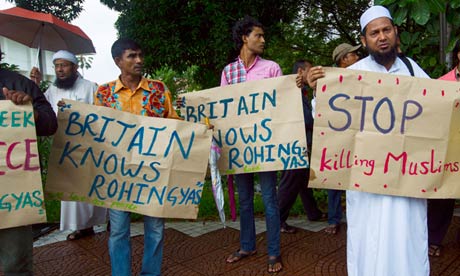Your Thoughts On The News About Burma?
 I'll be honest: this morning's news was the first time I learned about the conflict in Burma involving the Muslim Rohingya group, the government, and Rakhine Buddhists. So I'm hesitant to make any sort of statement beyond generalities of wishing everyone well.
I'll be honest: this morning's news was the first time I learned about the conflict in Burma involving the Muslim Rohingya group, the government, and Rakhine Buddhists. So I'm hesitant to make any sort of statement beyond generalities of wishing everyone well. But I know these events are important to me and my communities, even though the news of them comes to me filtered through many layers of perspective, institutional bias, and historical complexity. In the mainstream US, the word Buddhism often evokes a vague, Orientalized notion of calm imperturbability and pacifism. So some mainstreamers might feel surprised to learn that Buddhists are advocating or committing violence. This, I think, is part of a subtle sensationalism (in effect if not intent) of a headline like, "Burma's monks call for Muslim community to be shunned." My goodness, the reader exclaims, wide-eyed. Why would Buddhist monks want to shun anyone? How bizarre!Those of us more familiar with Buddhism might read between the lines and question the simplistic label of "Buddhist" itself. I appreciate how Arun (of Angry Asian Buddhist) puts it:
But I know these events are important to me and my communities, even though the news of them comes to me filtered through many layers of perspective, institutional bias, and historical complexity. In the mainstream US, the word Buddhism often evokes a vague, Orientalized notion of calm imperturbability and pacifism. So some mainstreamers might feel surprised to learn that Buddhists are advocating or committing violence. This, I think, is part of a subtle sensationalism (in effect if not intent) of a headline like, "Burma's monks call for Muslim community to be shunned." My goodness, the reader exclaims, wide-eyed. Why would Buddhist monks want to shun anyone? How bizarre!Those of us more familiar with Buddhism might read between the lines and question the simplistic label of "Buddhist" itself. I appreciate how Arun (of Angry Asian Buddhist) puts it:
I believe in the rights of Rohingya Muslims in Burma just as I believe in the rights of Jumma Buddhists in Bangladesh. I condemn the violence against both groups, and I condemn the history of persecution and oppression which cannot simply be washed away overnight. I furthermore condemn the simplification of political and socio-economic conflicts into religious terms of “Buddhist” versus “Muslim.” But I also try to cultivate understanding and compassions toward all involved in this conflict, I recognize that I have neither answers for nor a complete understanding of this conflict, and I don’t believe I can do anything of more substantive consequence on this blog than make this statement of my support for their rights and condemnation of their persecution.
But questioning the meaning of "Buddhist" can also take us in other directions — inevitably influenced (for better and worse) by a Western discourse about religious versus atheistic Buddhism. One person on Facebook responded to the news in Burma by saying,
hmmmm, are they really Buddhists then? Culturally yes, tho, not in practice?
Whether our impulse is to identify (oh, our fellow Buddhists!), disidentify (are they really Buddhists?), or call bullshit on the "Buddhist" label altogether, most of us will probably form some kind of opinion about this. Let's take the opportunity to learn from each other, then.Do you think today's news about Burma is a "Buddhist" issue? Does that affect how you form opinions about what you read on the conflicts? Do you have more historical or experiential knowledge about these conflicts that you'd like to share with the rest of us?* * *[Top Photo: Rohingya refugees in Malaysia protest outside the British high commission in Kuala Lumpur against the violence in Burma. Photograph: Ahmad Yusni/EPA]